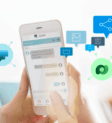6 ways chatbots can help improve customer engagement in CPG & Retail industry

Juniper’s recent study, “Conversational Commerce: Market Outlook, Emerging Opportunities, and Forecasts 2021-2025,” has highlighted that the total spend over conversational commerce channels will reach $290 billion by 2025.
Conversational commerce leverages chatbots, messaging, and digital voice assistants to automate retail transactions and payments. Chatbots shall process $145 billion of the spend by 2025.
With customers adopting digital channels post-pandemic, customer experience has gained traction and become as significant as the products and services the brand provides. Customers, particularly in the fast-moving world of retail and CPG, not only expect speedy resolutions but also want brands to understand their preferences, interactions, and end-to-end history and remember them at every touchpoint.
In short, retail brands must take a proactive stance to comprehend the potential value of each customer interaction and how it can be leveraged to deliver personalized engagement.
Many organizations in the CPG and retail industry have started adopting AI-enabled chatbots to address these challenges. Chatbots offer a fast and easy way to interact with customers and help retailers streamline processes and earn more revenue.
Let’s explore in detail.
1. Send personalized product recommendations after understanding customer needs
Chatbots can study customer profiles to provide personalized product recommendations and engage smartly with customers by leveraging intelligent machine learning technology.
Moreover, retail brands may design bots to ask a few questions about the customer’s needs and preferences and then display a tailored collection of specific products that they may like. Customers can click through to the brand’s online store and make a purchase.
2. Push notifications about new products
Retail brands must concentrate their marketing efforts on the channels where customers are present and most likely to engage with the company.
They can deploy AI chatbots on popular messaging platforms like WhatsApp and Facebook Messenger to push alerts and notifications about new products and services, increase sales, and ensure customers are constantly engaged with the brand and its offerings.
3. Assist in online shopping
Chatbots can lead customers to the retailer’s online website, help them navigate the portal, suggest complementary/alternate products, and assist with payment and checkout.
Moreover, retail bots can also bring back customers who added products to their cart but left without buying anything. Abandoned cart reminders from a chatbot are beneficial in converting sales. Research shows they have 80% open rates compared to email’s 25% and ten times higher click-through rates.
4. Give personalized tips and advice
Brands can use chatbots to send personalized tips, diagnosis, and advice and help customers select the right products.
Moreover, they can provide additional product information and suggestions on how to use the product.


Unox has been linked to Dutch cuisine for over 80 years. The brand is popular for its smoked sausages, frankfurters, and canned soup.
Through its website chatbot, “Mark,” the brand answers customer queries, addresses their complaints, and provides recipes for delicious Dutch dishes, with options for vegetarian recipes too.


Another brand in the food space that has deployed a chatbot to deliver personalized engagement to website visitors is Conimex.
Conimex brings delicious Asian flavors to the Netherlands. With more than 100 products, including soy sauce, sambal, side dishes, soups, and marinades. The brand’s website bot Connie helps customers answer questions, give suggestions and feedback, and look for recipe inspiration.

Whole Foods’s Facebook Messenger chatbot helps customers find recipes based on meal type, ingredients, and dietary restrictions— foods for dinner, gluten-free and vegan recipes, etc. Customers can use emojis or a combination of text and emojis to find new meals.
Moreover, they may also check if their nearest Whole Foods retail store has the required ingredients for a particular recipe.

POND’s SAL is an interesting example of how chatbots have transformed post-pandemic customer engagement in the retail industry. Customers can access SAL through Unilever’s flagship store on Shopee under “chat.”
After that, a user must upload a selfie, and based on the headshot, the bot identifies key skin concerns in four significant areas— wrinkles, pimples, spots, and uneven skin tone. While the skin analysis takes place, the bot keeps sending beauty tips to keep the user engaged.
Post the skin analysis, SAL recommends suitable products from POND’s according to the user’s skin type.
98% of users cited positive ratings with SAL. 95% of users who have completed the SAL experience on Shopee have enjoyed the personalized shopping experience.
5. Provide customer support
AI chatbots can assist users with their queries, handle grievances, and provide product support.
Chatting with a bot is not only fast and convenient— users can request support at any time of the day and through any platform the brand is on. The chatbot will be available instantly to provide personalized support.
Moreover, retailers can customize their bots to support multiple languages— driving engagement and localizing experiences for global customers.
6. Boost customer loyalty and advocacy through offers and feedback



Digidentist, Pepsodent’s personalized oral care advisor, helps you with common oral health problems, including tooth pain, sensitivity, tooth decay, etc. The bot is a free online tool to help with oral health concerns quickly and provide personalized healthcare advice endorsed by the IDA.
Moreover, Digidentist collects personal information from website visitors, such as phone numbers and email addresses, to send information about Pepsodent and other Unilever brands’ products, services, and offers.
Chatbots can build customer loyalty by sending freebies, offers, and discount coupons to customers through email and social media.
Moreover, data collected by the bot helps retailers predict customer needs, understand the features they like and the ones they don’t prefer, and design products and marketing campaigns accordingly.
Additionally, retailers can use bots to collect customer feedback, understand their pain points, and help solve these through suitable engagement.
Building loyalty increases customer satisfaction (CSAT) levels and improves the Net Promoter Score (NPS).
Meet HelloFresh’s Freddy

HelloFresh sells pre-curated meal kits in the US. The company delivers step-by-step recipes complete with nutritional information and fresh, pre-measured ingredients to help customers whip up delicious meals in no time.
HelloFresh has deployed a customer-facing chatbot called Freddy. Freddy’s primary purpose is to shorten wait times for customers by responding to customer queries. Besides providing customer support, the bot offers recipe suggestions to customers looking for a particular dish, reminds users to pick their weekly meals on time, and provides Spotify playlist recommendations so that customers have something to listen to while cooking their meals.
The bot also comes with built-in “food-themed” quizzes to engage and entertain users. Freddy has been so successful that HelloFresh has recorded a 47% increase in incoming messages and witnessed a staggering reduction in response times by 76%.
How can Acuvate help?
At Acuvate, we help our retail and CPG clients deploy customer-facing chatbots to deliver fast, interactive, and personalized customer engagement with our enterprise bot-building platform called BotCore.
As a Microsoft Gold Partner, we leverage the best of Microsoft’s AI, machine learning (ML), and natural language processing (NLP) technologies.
BotCore boasts of the following capabilities —
- An intuitive, low-code, visual interface allows the quick implementation of AI chatbots in the fast-paced retail world.
- Seamless integration with existing legacy systems and AI services
- Our chatbots simulate highly complex customer conversations.
- Our bots are deployable on almost all popular enterprise messaging and social media channels and support multiple languages, including English, German, French, Italian, etc.
Moreover, we help clients build and deploy AI chatbots using Microsoft’s low-code bot-building solution called Power Virtual Agents.
To know more about BotCore, please feel free to schedule a personalized consultation with our experts.
Abhishek is the AI & Automation Practice Head at Acuvate and brings with him 17+ years of strong expertise across the Microsoft stack. He has consulted with clients globally to provide solutions on technologies such as Cognitive Services, Azure, RPA, SharePoint & Office 365. He has worked with clients across multiple industry domains including Retail & FMCG, Government, BFSI, Manufacturing and Telecom.






Abhishek Shanbhag